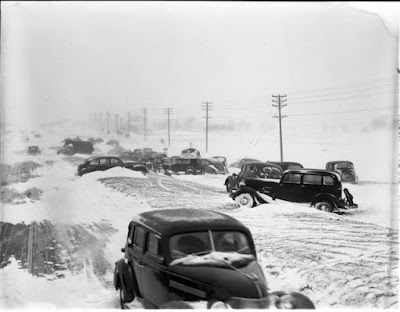 |
| Weather map for this Thursday shows a strong November storm over the Great Lakes. |
We're all acquainted with wintertime nor'easters in New England, severe weather outbreaks in the Plains in the springtime, and late summer and autumn hurricanes menacing the Gulf Coast.
There's another classic weather type this time of year, and that's the big Great Lakes storms.
November is the big month for these intense storms that get going in the Plains and reach peak intensity as the pass northeastward through the Great Lakes.
They get so strong over the lakes in part because the water there is still relatively warm from the summer. This warm, moist air feeds energy into these storms, much like the much larger bathwater of the Gulf Stream muscle up those winter nor'easters in New England.
One of those Great Lakes storms is set to blossom later this week. In the grand scheme of things, this one will be far from the most intense you can get, but it'll set off some typical November drama.
In the Great Lakes, there will be stormy seas and battering waves, so I'm sure shippers will take note. On the back side of these storms, there's often some pretty good snows. Parts of the northwestern Great Lakes will get some snow out of this.
These Great Lakes storms are also often the cause of some severe weather in the Midwest and South, and that seems possible with this late week storm, too. However, at this point it doesn't look like it will be a big outbreak.
For us in Vermont these Great Lakes storms usually give us a bout of strong, warm southerly winds, a burst of pretty decent rainfall, followed by colder west winds and snow showers.
That seems to be our fate with this one. After a nice week, we'll get that warm, windy, wet weather on Friday and maybe into Saturday, followed by chillier, snow showery weather late in the weekend.
As mentioned, this particular storm won't be historic, but just your typical November inclemency.
Some of these Great Lakes storms in the past are well remembered, though. The most famous one has to be the November, 1975 storm that sank the ship Edmund Fitzgerald in Lake Superior. OF course you know the song that disaster inspired.
A far worse storm hit the Great Lakes in November, 1913, sinking 19 ships in Lake Huron, killing 247 people. The storm was known as the "White Hurricane" for the blizzard that accompanied it. Winds gusted to 80 mph during the storm in Cleveland.
In 1940, a storm hit the Pacific Northwest. That one was responsible for the famous "Galloping Gertie" collapse of the Tacoma Narrows Bridge.
 |
| Armistice Day Blizzard, November, 1940 in Minnesota. |
The storm's cold front brought a sudden drop in temperatures to well below zero and an intense blizzard. Many of these duck hunters became lost and stranded and died. Three boats sank in Lake Superior, killing 58 mariners.
The Great Appalachian Storm of 1950 was further east, moving up the west slopes of the Appalachians and into the eastern Great Lakes. That storm produced an intense blizzard and record cold temperatures in parts of the Great Lakes and east. One town in West Virginia saw 62 inches of snow.
To the east of the storm center, those strong south winds typical of these Great Lakes storms grew especially intense. Winds gusted to 108 mph in Newark, New Jersey, 94 mph in New York City and 70 mph up here in Burlington, Vermont. This storm killed 160 people.
Another Great Lakes storm in November, 2013 wasn't particularly memorable as a big windstorm on the open waters of the lakes. But it did cause an intense tornado outbreak in and around Illinois that killed three people and injured more than 125 others.
With this kind of track record for November Great Lakes storms, we can be thankful that the one later this week won't be of that caliber.

No comments:
Post a Comment